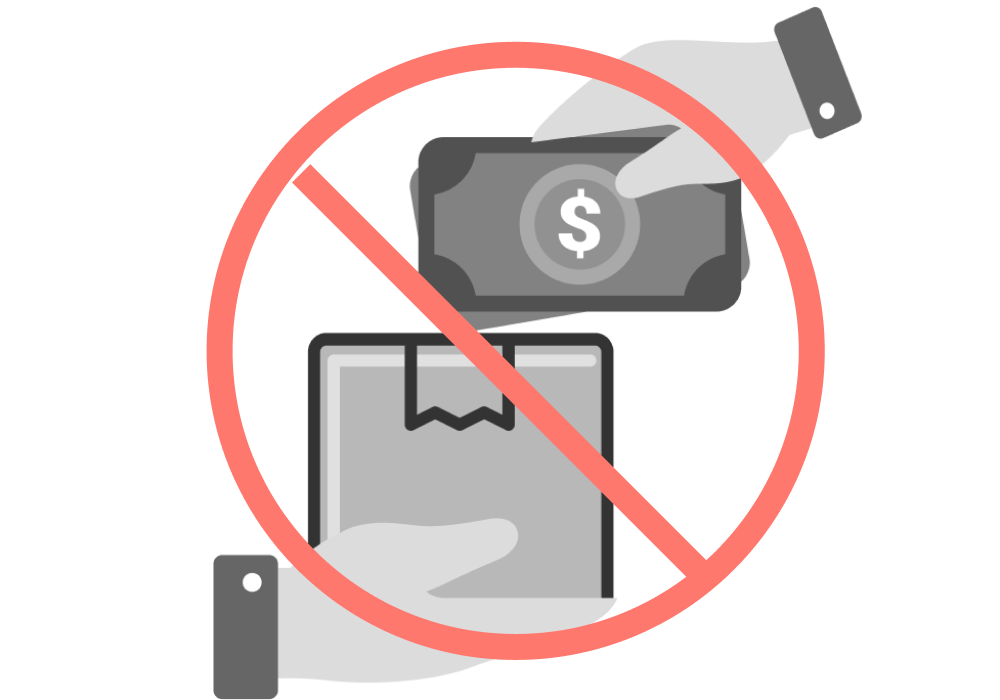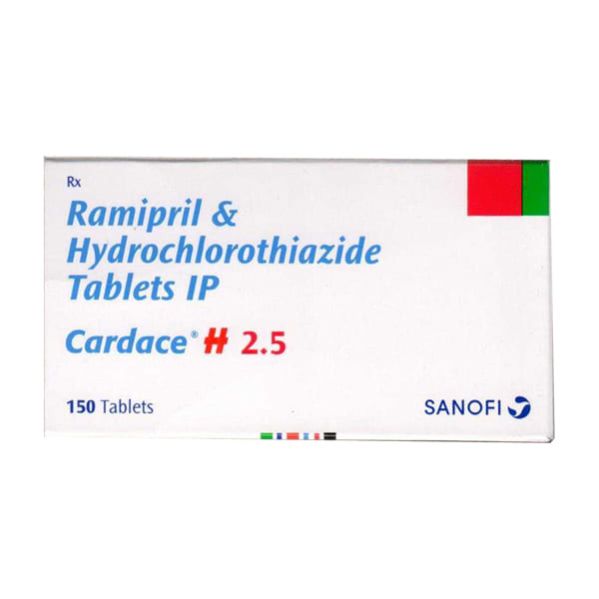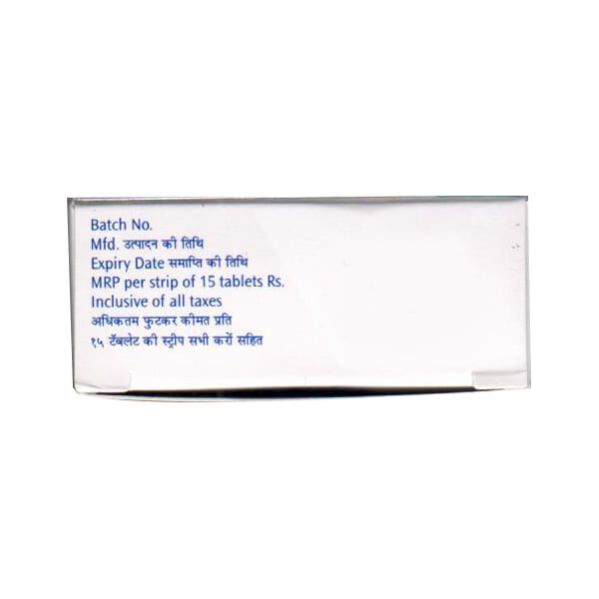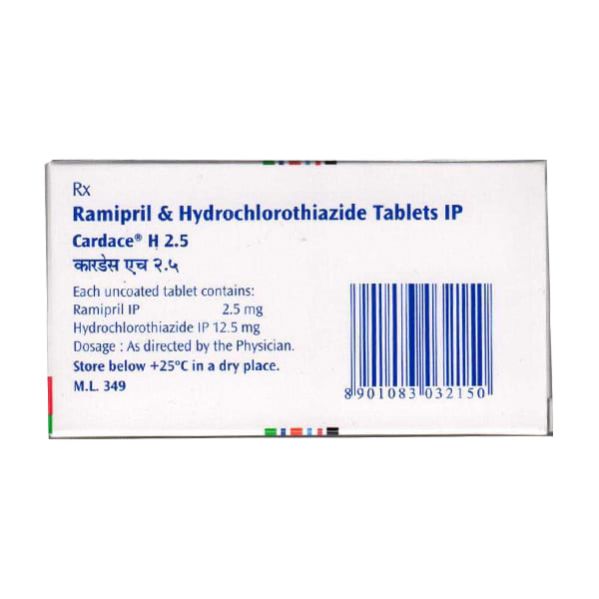CARDACE H 2.5 Tablet 15's
Keep CARDACE H 2.5 TABLET out of reach to children Store at normal room temperature
₹ 210.00
₹222
(Inclusive of all taxes)
-

No Warranty
-

COD Not Avilable
-

Non Returnable
-

Non cancelable
About this item
INTRODUCTION ABOUT CARDACE H 2.5 TABLET
CARDACE H 2.5 TABLET is a combination of Ramipril and Hydrochlorothiazide which belongs to the group of medicines called Angiotensin-converting enzyme (ACE) inhibitors and Diuretics respectively. It is used in the management of essential hypertension.
Hypertension is a condition in which force of the blood is consistently high against the walls of the arteries which can increase the risk of heart disease, kidney disease and stroke.
Before taking CARDACE H 2.5 TABLET, inform your doctor if you are pregnant or breast-feeding. Inform your doctor if you have any problems related to kidney, liver, lungs or heart and if you have other conditions such as diabetes, gout, myopia, glaucoma, collagen vascular disease or parathyroid disease.
CARDACE H 2.5 TABLET is not recommended for use in children and adolescents less than 18 years of age. If you are taking any other medicines for other conditions or if you have history of allergy, inform to your doctor as it may manage drug-related interactions and serious side effect.
The most common side effect of CARDACE H 2.5 TABLET are headache, dizziness, stomach pain, tiredness and nausea. Consult your doctor for advice if your symptoms get worsen over the time.
USES OF CARDACE H 2.5 TABLET
- Used to manage essential hypertension (high blood pressure)
HOW CARDACE H 2.5 TABLET WORKS
CARDACE H 2.5 TABLET helps to reduce high blood pressure, where Ramipril works by inhibiting the activity of an enzyme called Angiotensin converting enzyme (an enzyme which is responsible for causing constriction of blood vessels) which enhances easy flow of blood around the body. Hydrochlorothiazide works by decreasing the extra fluid volume also works by managing reabsorption of sodium in the kidneys, which in turn it relaxes the blood vessels and makes the blood flow more easily in the passage of blood vessels and thus lowers the blood pressure.
DIRECTIONS FOR USE
Always take CARDACE H 2.5 TABLET as directed by your physician. Take this medicine with or without food, swallow the medicine as a whole and do not crush or chew the medicine. Your doctor will prescribe the right dose depends on your child’s age, body weight and disease condition.
SIDE EFFECTS OF CARDACE H 2.5 TABLET
COMMON
- headache
- tiredness
- dizziness
- orthostatic hypotension (dizziness while standing up from sitting or lying position)
- dry cough, inflammation of sinus
- stomach pain, indigestion
- diarrhea
- nausea
- chest pain
- pain or cramps in muscles
- signs of high potassium levels in the blood (muscle weakness, chest pain, irregular heartbeat)
UNCOMMON
- numbness, tingling, pricking, burning or creeping sensation in arms, legs or feet
- altered taste sensation, loss of appetite
- sleep problems
- depression, anxious, restlessness
- heartburn, dry mouth
- constipation
- increased urination
- excess sweating
- increased or irregular heartbeats
- flushing
- blurred vision
- fever
- reduced libido in men or women
- joint pain
RARE
- red and swollen tongue
- nail problems (loosening or separation of a nail from its bed)
- cold hands or feet
- anemia
- hearing problems or ringing in ear sensation
- signs of low while blood cells (fever, infections, mouth sores)
- signs of low platelet count (easy bruising or bleeding)
Stop taking CARDACE H 2.5 TABLET and contact your doctor immediately if you experience any of the following side effects:
- severe allergic reactions (such as swelling of the face, lips, tongue and/or throat which can lead to difficulty in breathing or swallowing, as well as itching and rashes)
- severe skin reactions such as stevens johnson syndrome, toxic epidermal necrolysis or erythema multiforme (such as rash, blistering, reddening and detachment of skin, mouth ulcers and worsening of previous skin disease)
- signs of lung problems (such as shortness of breath or cough)
- fast or irregular heartbeat, chest pain, chest tightness, including heart attack or stroke
- signs of inflamed pancreas (such as severe stomach and back pain)
- signs of liver problems such as hepatitis or liver damage (such as fever, chills, loss of appetite, stomach pain, nausea, (jaundice) yellowing of skin or white of the eyes)
- signs of blood or bone marrow problems (such as easy bruising, prolonged bleeding, bleeding from gums, purple spot and blotches on the skin, sore throat, repeated infections, pale skin, tiredness, fainting and dizziness)
HOW TO MANAGE SIDE EFFECTS
Diarrhoea:
Drink plenty of fluids such as water, fruit juices or electrolytes (ORS) to avoid dehydration in your body. Consult your doctor if your symptom does not improve.
Nausea:
Try to take this medicine with or just after, a meal or snack and stick to simple meals and do not eat oil rich or spicy food. Consult your doctor if your symptom does not improve.
Dizziness:
Lie down until dizziness passes away and then move slowly and carefully. Take plenty amount of rest and drink plenty of fluids. Consult your doctor if your symptom worsens.
Headache:
Apply hot or cold-water bag on your head. Try taking rest in a quiet and dark room. Drink tea or coffee. Consult your doctor if your symptom worsens.
Tiredness:
Drink plenty of fluid and eat balanced diet and frequent meals. Do regular minimal exercise and follow regular sleep schedule. Consult your doctor if your symptom does not improve.
WARNING & PRECAUTIONS
PREGNANCY
CARDACE H 2.5 TABLET is not recommended for use during pregnancy, as it may cause serious harm to the baby. Consult your doctor for advice before taking CARDACE H 2.5 TABLET.
BREASTFEEDING
CARDACE H 2.5 TABLET is not recommended for use in breast-feeding women. Consult your doctor for advice before taking CARDACE H 2.5 TABLET.
DRIVING AND USING MACHINES
Do not drive or operate any machines if you experience light-headedness, dizziness and fainting due to low blood pressure. Consult your doctor for advice before taking CARDACE H 2.5 TABLET.
ALCOHOL
Consumption of alcohol is not recommended during management with CARDACE H 2.5 TABLET as it may cause dizziness, light-headedness or orthostatic hypotension (dizziness while standing up from sitting or lying position due to low blood pressure).
KIDNEY
CARDACE H 2.5 TABLET is not recommended for use in patients with severe kidney impairment, renal artery stenosis or patients undergoing dialysis. Consult your doctor for advice before taking CARDACE H 2.5 TABLET.
LIVER
CARDACE H 2.5 TABLET is not recommended for use in patients with severe liver impairment and should be used with caution in patients with progressive liver disease. Consult your doctor for advice before taking CARDACE H 2.5 TABLET.
ALLERGY
Do not take CARDACE H 2.5 TABLET if you are allergic to Ramipril and Hydrochlorothiazide or any other ingredients of this medicine.
LUNGS
CARDACE H 2.5 TABLET should be used with caution in patients with history of bronchial asthma. Consult your doctor for advice before taking CARDACE H 2.5 TABLET.
HEART DISEASE
CARDACE H 2.5 TABLET is not recommended for use in patients with low or unstable blood pressure and it should be used with caution in patients with heart problems. Consult your doctor for advice before taking CARDACE H 2.5 TABLET.
OTHERS
CARDACE H 2.5 TABLET is not recommended for you, if you have:
- difficulty urination
- personal or family history of angioedema
- electrolyte disturbances
Before taking CARDACE H 2.5 TABLET, inform your doctor if you have:
- diabetes
- scleroderma or systemic lupus erythematosus
- dehydration problems
- upcoming major surgery including dental surgery which requires anaesthesia for numbness or sedation
- personal or family history of skin cancer
- high levels of potassium in the blood
- acute myopia and secondary angle-closure glaucoma
- parathyroid disease
- gout or increased levels of uric acid in the blood
- raynaud’s phenomenon (condition resulting from poor circulation in the extremities, such as fingers and toes)
Use in pediatrics:
CARDACE H 2.5 TABLET is not recommended for use in children and adolescents less than 18 years of age. Consult with your doctor for advice before taking CARDACE H 2.5 TABLET.
Use in geriatrics:
CARDACE H 2.5 TABLET should be used with caution in elderly patients above 65 years of age, usually initiating the management with the lowest effective. Consult with your doctor for advice before taking CARDACE H 2.5 TABLET.
INTERACTIONS
A. Drug-Drug interactions:
Before taking CARDACE H 2.5 TABLET inform your doctor if you are taking any of following medicines:
- indomethacin, ibuprofen, aspirin, (used to relieve pain and swelling)
- ephedrine, noradrenaline or adrenaline (used to manage low blood pressure, asthma, allergies or heart failure)
- sacubitril/valsartan (used to manage long-term heart failure)
- cyclophosphamide, methotrexate (used to manage cancer)
- ciclosporin, sirolimus, everolimus (used to manage organ rejection after transplant)
- furosemide (used to manage edema or high blood pressure)
- spironolactone, amiloride, triamterene (used to retain or increase potassium levels)
- heparin (used to manage blood clots)
- prednisolone, hydrocortisone (used to manage swelling)
- allopurinol (used to manage gout or decrease uric acid levels in blood)
- procainamide (used to manage irregular heart rate)
- temsirolimus (used to manage cancer)
- carbenoxolone (used to manage peptic disease)
- racecadotril (used to manage diarrhea)
- vildagliptin (used to manage diabetes)
- lithium (used to manage mental health problems)
- trimethoprim alone or in combination with sulfamethoxazole, co-trimoxazole (used to manage bacterial infections)
- gold (used to manage arthritis)
- phenobarbital, phenytoin, carbamazepine, topiramate (used to manage seizures)
- citalopram, escitalopram and sertraline (used to manage depression)
- morphine (used to manage severe pain)
- cholestyramine and colestipol resins (used to manage high cholesterol)
- adrenocorticotropic hormone (used to manage west syndrome)
- calcium and vitamin D supplements
- amphotericin B (used to manage fungal infections)
Overdosage:
If you or anyone else accidentally takes too much of CARDACE H 2.5 TABLET, consult your doctor immediately. Overdosage may cause side effects such as electrolyte depletion, slow heart rate, increased urination, kidney failure, muscle weakness and paralysis of intestine.
SYNOPSIS
| Drug | : | Ramipril, Hydrochlorothiazide |
| Pharmacological Category | : | Angiotensin-II converting enzyme inhibitors, Diuretics |
| Therapeutic Indication | : | Hypertension |
| Dosage Forms | : | Tablet, Capsule |
0 Review Of Product CARDACE H 2.5 Tablet 15's















